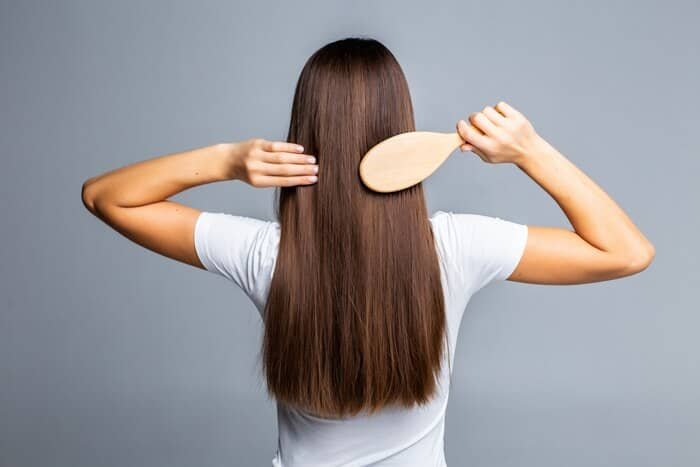In This Article
Introduction
In our modern world, the health of our hair is affected by many different factors, such as what we eat, the environment we’re in, and the products we choose to use. Highlighting the importance of natural ingredients in hair care can lead to hair that is not only healthier but also more vibrant. Natural ingredients are beneficial not only for the hair itself but also for the scalp, delivering essential nutrients that many synthetic products lack. In this discussion, we will explore the significance of using natural ingredients and look at some common hair issues many people experience. Today we discuss The Best Natural Ingredients for Healthy Hair
Importance of Natural Ingredients for Hair Health
Natural ingredients bring a host of benefits for maintaining healthy hair. They are often loaded with vitamins, minerals, and antioxidants that nourish the hair and the scalp. For example, oils like coconut and argan oil can penetrate the hair shaft effectively, providing necessary moisture and helping to reduce breakage. Ingredients such as aloe vera and honey are known for their soothing properties, which can ease scalp irritation and foster a healthy environment for the scalp. Moreover, natural ingredients typically do not contain harsh chemicals that strip the hair of its natural oils, making them a safer choice for long-term use. By incorporating natural ingredients into their hair care regimens, individuals can achieve hair that is not just stronger and shinier but also more manageable.
Overview of Common Hair Issues
Many people face hair issues that affect their overall look and self-confidence. Some of the most common problems include:
- Dryness: This is often caused by environmental factors, frequent heat styling, or harsh products, leading to frizz and breakage.
- Dandruff: This condition causes flaking and itching of the scalp, often due to dryness or an overproduction of oil.
- Hair Loss: Stress, hormonal changes, and nutritional deficiencies can all contribute to thinning hair and hair loss.
- Split Ends: Damaged hair can lead to split ends, which make hair appear unhealthy and untidy.
- Oily Hair: An overactivity of sebaceous glands can result in excess oil on the scalp, causing hair to look greasy.
Understanding these common hair issues is the first step toward effectively addressing them. By selecting hair care solutions that focus on natural ingredients, individuals can tackle these problems while promoting overall hair health.
Key Natural Ingredients
This section will dive into some essential natural ingredients that can elevate hair care routines, highlighting their benefits and how to use them effectively.
1. Coconut Oil
Coconut oil is a versatile oil extracted from the flesh of mature coconuts, celebrated for its incredible benefits, particularly for hair care.
- Benefits for moisture and shine: This oil contains fatty acids that deeply moisturize hair and prevent dryness. Thanks to its unique structure, coconut oil can penetrate the hair shaft more effectively than many other oils, enhancing hydration. This added moisture results in shinier hair, helps reduce frizz, and improves overall appearance.
- How to use it effectively: To enjoy the perks of coconut oil, there are several ways to apply it. For a conditioning treatment, warm a small amount of coconut oil in your hands and distribute it through dry hair, concentrating on the ends. Allow it to sit for at least 30 minutes or overnight for an intensive conditioning effect, and then wash it out with shampoo. You can also use coconut oil as a leave-in conditioner; a small amount can help tame flyaways and boost shine. Consistent use can lead to healthier, more manageable hair.
2. Aloe Vera
Aloe Vera is a succulent plant celebrated for its many health benefits, particularly in hair care. Its gel-like substance contains vitamins, minerals, and enzymes that can significantly improve hair health. Let’s explore its fundamental properties in detail:
Soothing Properties for the Scalp
Aloe Vera possesses natural anti-inflammatory and calming qualities that can help ease scalp irritation and itchiness. It contains compounds like salicylic acid that can reduce dandruff and create a healthier environment for your scalp. Aloe Vera gel’s cooling effect relieves discomfort caused by sunburn or other scalp issues. Aloe Vera lays the groundwork for optimal hair growth by promoting a healthy scalp.
Nourishing Hair Growth
Aloe Vera is packed with essential nutrients, including vitamins A, C, and E, crucial for healthy hair growth. These vitamins aid in cell turnover and help repair damaged hair follicles, resulting in thicker and healthier locks. Moreover, the high water content in Aloe Vera helps to hydrate your hair, preventing dryness and breakage. The enzymes found in Aloe Vera also work to eliminate dead skin cells from the scalp, which allows for better nutrient absorption and fosters a strong hair growth cycle.
Incorporating Aloe Vera into your hair care routine can enhance scalp health and promote hair growth, making it a valuable addition for anyone looking to boost their hair’s vitality.
3. Argan Oil
Argan oil, extracted from the nuts of the argan tree found in Morocco, is celebrated for its wide range of health and beauty benefits. Often dubbed “liquid gold,” this oil is prized for its rich nutrient profile and versatility across different uses.
Packed with Vitamins and Fatty Acids
Argan oil contains essential vitamins, especially vitamin E, a powerful antioxidant. This vitamin is vital to shielding the skin and hair from oxidative stress caused by free radicals, promoting a healthier look. Moreover, argan oil contains a high concentration of fatty acids, like oleic and linoleic acids. These fatty acids are vital in keeping the skin hydrated and elastic, making argan oil an outstanding moisturizer for the skin and a nourishing hair treatment.
Protection Against Heat and Styling Damage
A standout feature of argan oil is its remarkable ability to protect against heat damage. Applying to hair before styling creates a protective barrier that shields the hair from the high temperatures generated by styling tools such as hair dryers, curling irons, and straighteners. This protective characteristic helps to prevent breakage, split ends, and overall damage, ensuring that hair stays healthy and vibrant, even with frequent styling. Additionally, argan oil’s moisturizing properties help tame frizz and boost shine, resulting in smoother, more manageable hair.
Adding argan oil to your beauty routine can offer immediate and long-lasting benefits, making it an essential product for anyone interested in improving their skin and hair health.
4. Jojoba Oil
Mimics Natural Scalp Oils
Jojoba oil stands out because its makeup is similar to the natural oils our scalp produces, known as sebum. This close resemblance means that jojoba oil can nourish and moisturize the scalp effectively without leaving any greasy residue or buildup. By imitating these natural oils, jojoba oil helps create a healthy environment on the scalp, which is essential for hair growth and overall vitality. It provides hydration to prevent dryness and flakiness, making it a fantastic option for anyone with dry or sensitive scalps.
Balances Oil Production
One of the standout advantages of jojoba oil is its ability to balance oil production. For those with oily scalps, jojoba oil can help regulate how much sebum is produced. When applied, it sends a signal to the scalp to cut back on its oil production, helping to tackle issues linked to overly greasy hair. On the other hand, for individuals with dry scalps, jojoba oil delivers moisture without overwhelming the scalp, striking the right balance. This quality makes jojoba oil ideal for all hair types, as it works to restore harmony in the scalp’s oil levels, encouraging healthier hair growth and a more manageable texture.
5. Honey
Honey is a natural substance made by bees using the nectar from flowers. For centuries, it has been cherished not just as a sweetener but also for its many health benefits. In this section, we’ll explore two critical properties of honey: its ability to act as a natural humectant for hydration and its rich antioxidant content.
Natural Humectant for Hydration
A humectant is a substance that helps retain moisture, and honey is a fantastic natural humectant. It attracts moisture from the air, keeping skin and hair hydrated. When applied to the skin, honey can pull moisture in, resulting in a soft and supple feel. This makes honey a top choice for skincare products, especially for those dealing with dryness. Furthermore, consuming honey can help maintain the body’s hydration levels, promoting overall health and well-being.
Antioxidant Properties
Honey is packed with antioxidants, compounds that protect the body from oxidative stress caused by free radicals. These antioxidants are crucial in fighting inflammation and lowering the risk of chronic diseases. The types of antioxidants found in honey can vary based on the flowers the bees visit, but they typically include flavonoids and phenolic acids. Regularly enjoying honey may enhance overall health, strengthen the immune system, and improve skin health by guarding against damage from environmental factors like pollution and UV rays.
In summary, honey is a powerful natural humectant that helps keep things hydrated and offers essential antioxidant benefits. This makes it a fantastic addition to both diets and skincare routines.
6. Avocado
How Avocado Helps Repair Hair
Avocado isn’t just a tasty fruit; it’s also a powerhouse for promoting healthy hair. Packed with essential nutrients, it provides a range of benefits that aid in repairing and upkeep damaged hair.
Nutrient-Rich Composition
Avocados are loaded with vital vitamins and minerals, including:
- Vitamin E: This antioxidant helps minimize oxidative stress, keeping your scalp healthy and preventing hair loss.
- Vitamin A: Essential for cell growth, it supports the production of sebum, which moisturizes the scalp and gives hair a beautiful shine.
- B Vitamins: These are key for hair growth and overall health, strengthening hair follicles.
Moisturizing Properties
The healthy fats in avocados, especially monounsaturated fats, deliver intense moisture to dry and brittle hair. This hydration helps restore elasticity and reduces breakage, making your hair much easier to manage.
Repairing Damaged Strands
Avocado is rich in amino acids, which serve as the building blocks of proteins. When applied to your hair, these amino acids penetrate the hair shaft, repairing and strengthening damaged strands. This process can help smooth split ends and enhance the overall texture of your hair.
Scalp Health
A healthy scalp is crucial for effective hair repair. The anti-inflammatory properties of avocado help soothe an irritated scalp, reduce dandruff, and create a favourable environment for hair growth.
How to Use Avocado for Hair Repair
- Avocado Hair Mask: Combine a ripe avocado with a tablespoon of olive oil and honey. Apply this mixture to your hair and let it sit for 30 minutes before rinsing. This mask intensely nourishes and hydrates your hair.
- Avocado Oil: Use avocado oil as a pre-shampoo treatment. Apply it to dry hair, focusing on the ends, and let it sit for at least 30 minutes before washing.
Incorporating avocado into your hair care routine can significantly enhance hair health, making it an excellent natural remedy for reviving tired and damaged hair.
DIY Hair Mask Recipes
Making your hair masks at home with natural ingredients is fun and a fantastic way to nourish and rejuvenate your hair. Here are some straightforward recipes, along with tips on how to apply them and how often to use them:
Easy Hair Masks with Natural Ingredients
- Avocado and Olive Oil Mask
- Ingredients: 1 ripe avocado and 2 tablespoons of olive oil.
- Instructions: Start by mashing the avocado until it’s nice and smooth, then mix in the olive oil. Apply this blend to your damp hair, concentrating on the ends. Let it sit for about 30 minutes before rinsing it with warm water. Avocado is packed with vitamins and healthy fats that can help moisturize and strengthen your hair.
- Banana and Honey Mask
- Ingredients: Indulge in this simple yet delicious treat with just one ripe banana and one tablespoon of honey.
- Instructions: Blend the banana with honey until you have a smooth paste. Apply this mixture to your hair from roots to ends, and let it sit for 20 to 30 minutes. Afterward, rinse it out thoroughly. This mask will help soften your hair and add a beautiful shine.
- Coconut Milk and Honey Mask
- Ingredients: 1 cup of coconut milk, 2 tablespoons of honey.
- Instructions: Combine the coconut milk and honey well. Add the mixture to your hair and scalp, then leave it on for 30 to 60 minutes before washing it out. Coconut milk is excellent for hydration, while honey is a natural humectant that locks in moisture.
Application Tips
- Start with Damp Hair: It’s best to apply the masks to damp hair as this helps the ingredients soak in better.
- Use a Wide-Tooth Comb: After you’ve applied the mask, gently comb through your hair to ensure an even distribution of the mixture.
- Cover with a Shower Cap: Wearing a shower cap can help keep the heat and moisture in, boosting the mask’s effectiveness.
- Rinse Well: Rinse your hair thoroughly after treatment to eliminate any leftover product.
How Often to Apply
- Once a Week: For most hair types, using a hair mask once a week is beneficial. This schedule gives your hair enough time to recover in between treatments.
- Adjust Based on Hair Needs: If your hair tends to be very dry or damaged, you might want to use a mask twice a week. On the other hand, if your hair is oily, consider using a mask every two weeks to avoid over-conditioning.
By adding these DIY hair masks to your hair care routine, you can take advantage of the nourishing benefits of natural ingredients, which can lead to healthier and more vibrant hair. Enjoy your pampering sessions!
Conclusion
Highlighting the Advantages of Using Natural Ingredients
Natural ingredients in hair care products provide a wide range of benefits that support hair health and overall well-being. Unlike synthetic chemicals, which can often lead to irritation or unwanted reactions, natural ingredients are gentler on your scalp and hair. These ingredients contain vitamins, minerals, and antioxidants that nourish hair follicles, encourage growth, and boost shine. For example, oils like coconut and argan are excellent for hydration and repairing damage, while aloe vera is great for soothing the scalp and reducing dandruff. By opting for products with natural ingredients, you can steer clear of harmful additives and promote healthier hair in a more eco-friendly way.
Tips for Adding Them to Your Hair Care Routine
Incorporating natural ingredients into your hair care routine is easier than you might think. Small changes can lead to significant improvements in hair health. Start by replacing one or two of your usual products with ones that contain natural components. For instance, try a shampoo that includes natural oils or botanical extracts. You can also create your treatments using simple kitchen ingredients, like honey for added moisture or apple cider vinegar for extra shine. By experimenting with these natural options, you’ll find what resonates best with your hair type. Regularly using these natural ingredients improves the look of your hair and fosters a more thoughtful approach to self-care that benefits both your hair and the planet.
FAQ Section
What are the benefits of using avocado in hair care?
Avocado is a powerhouse of vitamins and healthy fats that can work wonders for your hair. It helps to deeply moisturize, strengthen strands, and encourage healthy hair growth, making it an excellent addition to your hair care routine.
How often should I use a hair mask?
It’s generally recommended to use a hair mask once a week for most hair types. However, you can tailor this frequency to suit your hair’s specific needs, paying attention to how your hair responds after each treatment.
Can natural ingredients cause allergic reactions?
While natural ingredients are often gentler on the skin and hair, it’s still crucial to do a patch test before trying out any new product. This way, you can ensure that your skin doesn’t react negatively and that you can enjoy the benefits without any worries.
Is it safe to use DIY hair masks on coloured hair?
Definitely! Many DIY hair masks made with natural ingredients are safe for coloured hair. Just review the ingredients to ensure they won’t alter your hair colour, as some might have an effect if they contain vital elements.
How can I store leftover hair mask mixtures?
If you have any leftover hair mask, the best way to keep it fresh is by storing it in an airtight container and placing it in the refrigerator. Aim to use it within a few days to maintain its effectiveness and freshness.
What is the best way to rinse out a hair mask?
Using lukewarm water is ideal when it’s time to rinse out a hair mask. This temperature helps to open your hair cuticles, making it easier to remove the product thoroughly while ensuring your hair benefits from the treatment.
Will using a hair mask make my hair greasy?
Hair masks shouldn’t make your hair greasy when used correctly and not too frequently. However, applying too much product or putting it directly on your scalp can lead to greasiness, so following the recommended amounts is essential.
Can I mix different natural ingredients for hair masks?
Absolutely! Mixing different natural ingredients can be a fantastic way to create a hair mask that addresses your unique needs. Combining various elements allows you to customize the benefits, such as hydration, strengthening, or nourishing your hair.
How do I know if my hair needs moisture or protein?
If your hair feels dry and brittle, it’s typically craving moisture. On the other hand, if your hair feels elastic or stretchy, it may need protein to strengthen it and restore its structural integrity.
Are there any natural ingredients I should avoid if I have a sensitive scalp?
If you have a sensitive scalp, it’s wise to avoid certain ingredients, such as essential solid oils or known allergens, which can irritate. Instead, opt for gentler options like aloe vera or coconut oil, which are soothing and nourishing.
Can I use these natural scalp and hair masks?
Yes, many natural masks can benefit both your scalp and your hair! Applying them to your scalp can promote overall health while enhancing your hair’s vitality, making it an excellent all-around treatment.

Florence
Florence Delisy is a dedicated skincare and beauty expert with extensive industry experience. Certified in skincare and cosmetology from University of the Arts London, she specializes in personalized skincare routines, anti-aging treatments, and beauty consultations. Florence is committed to helping clients achieve healthy, radiant skin through tailored solutions and education on effective skincare practices.







